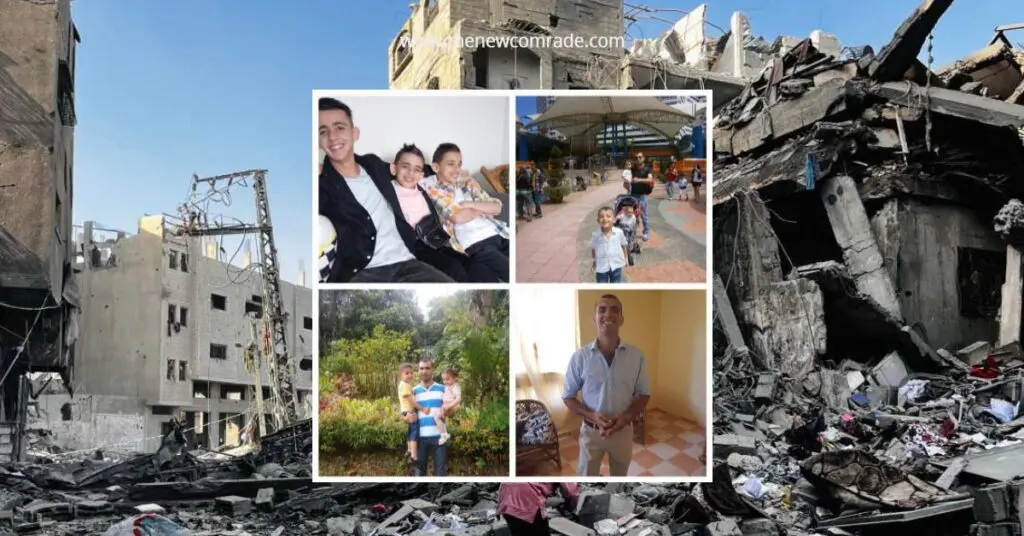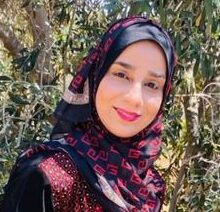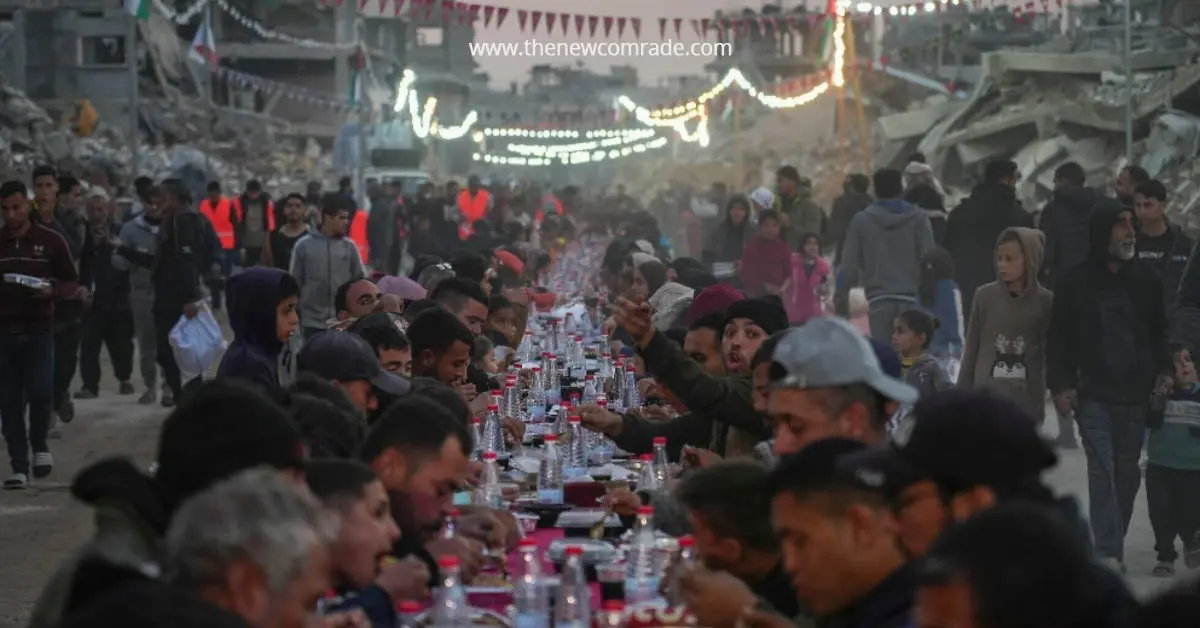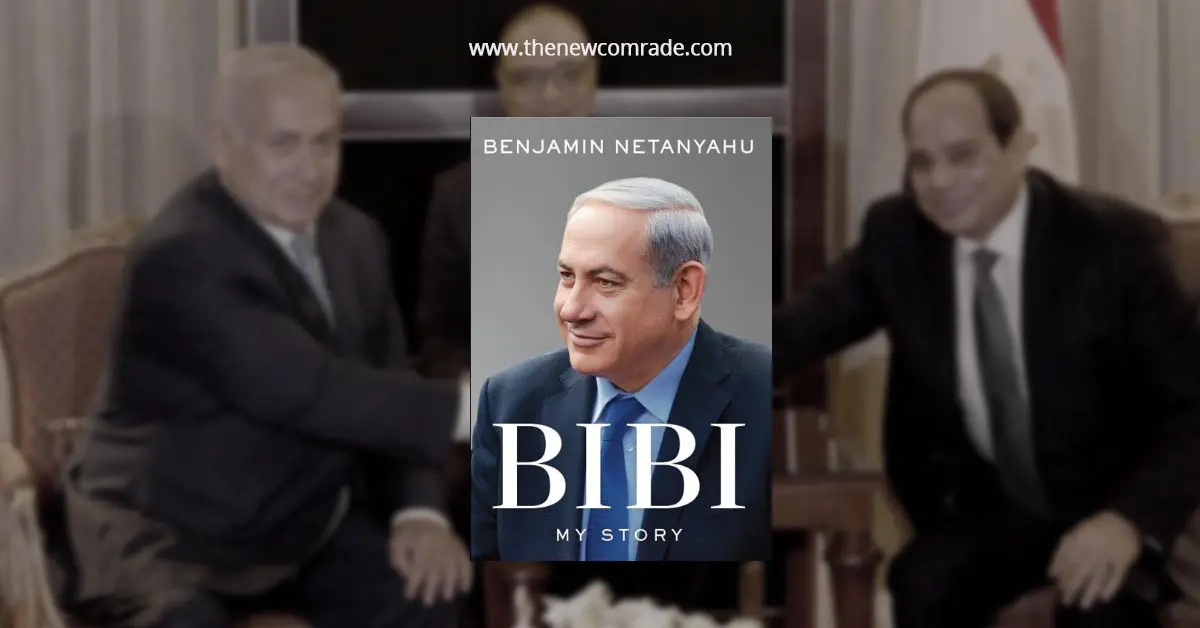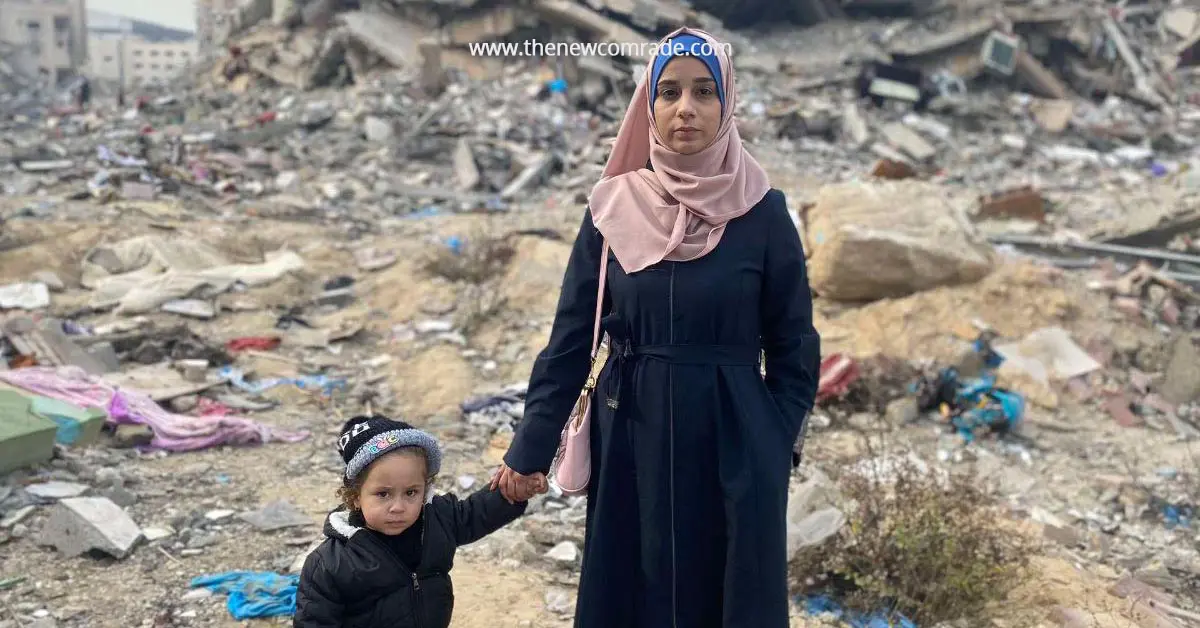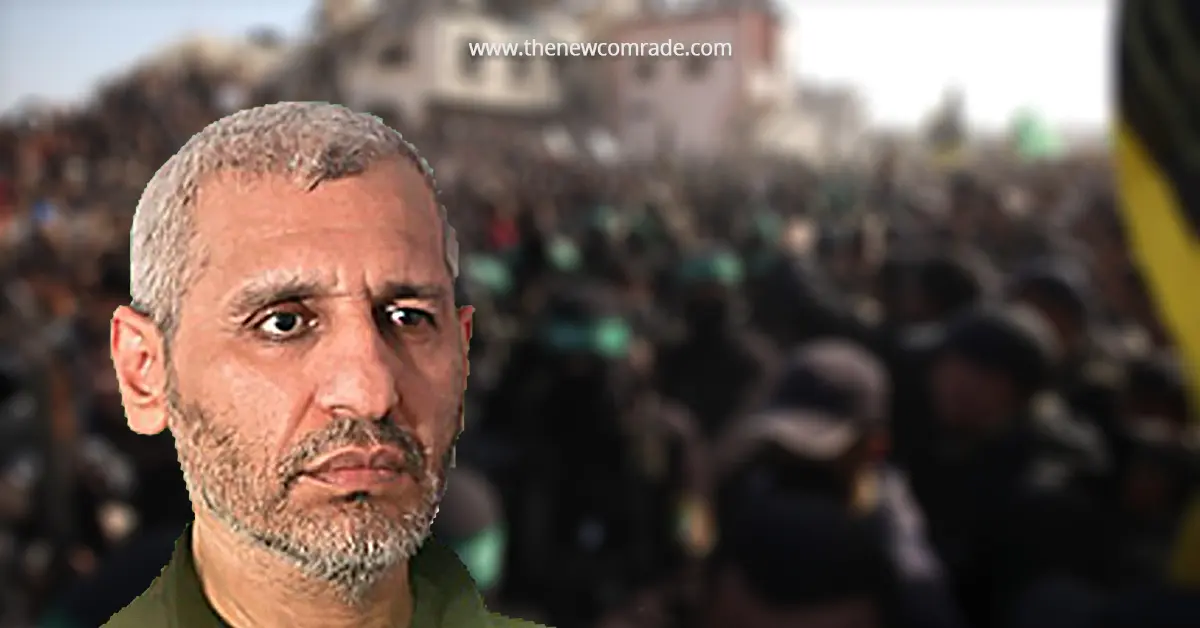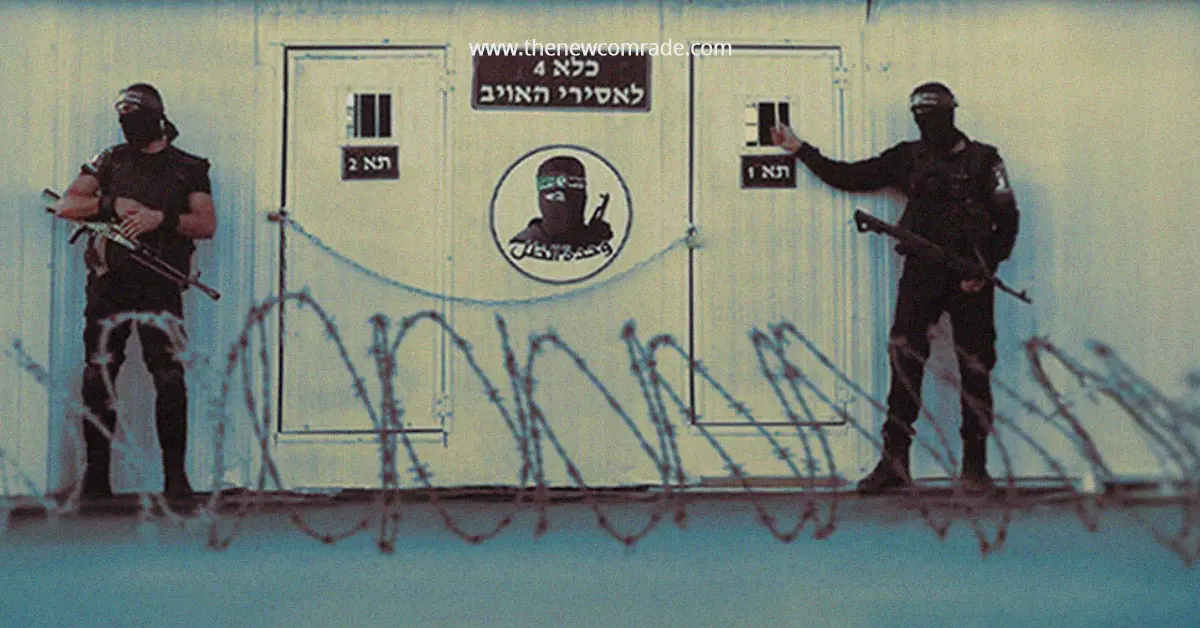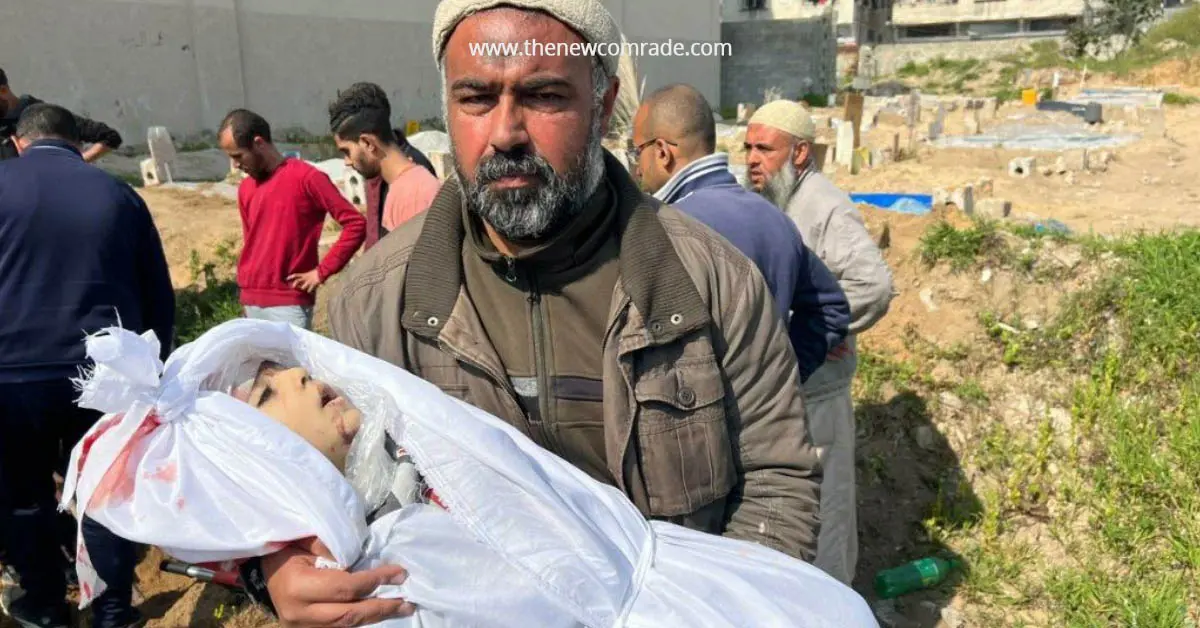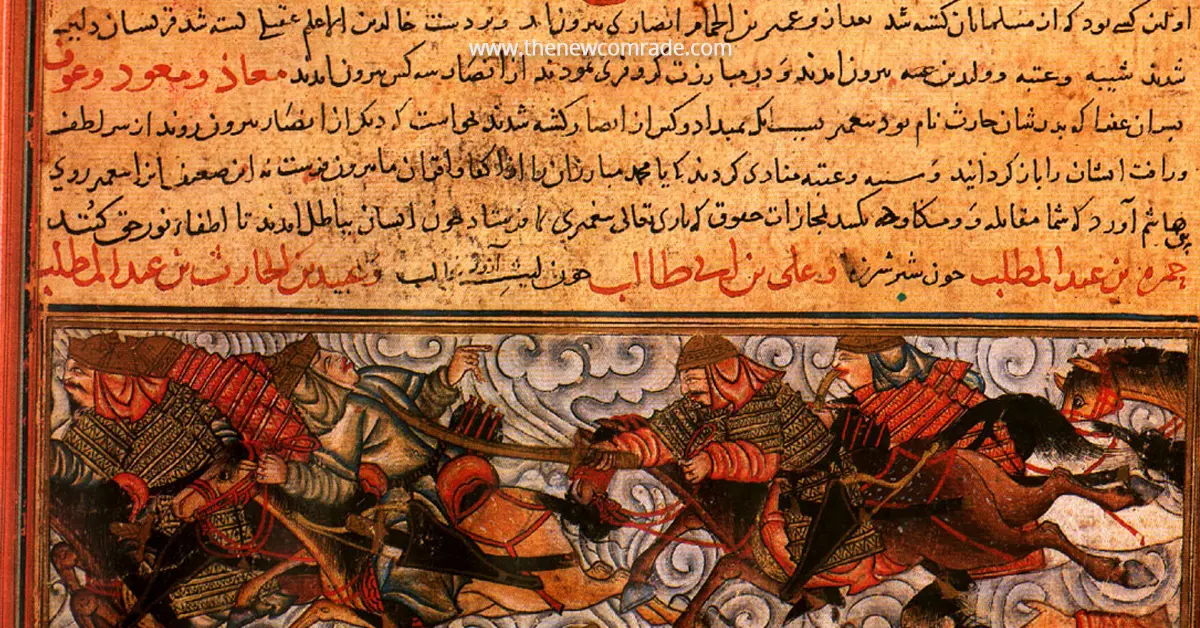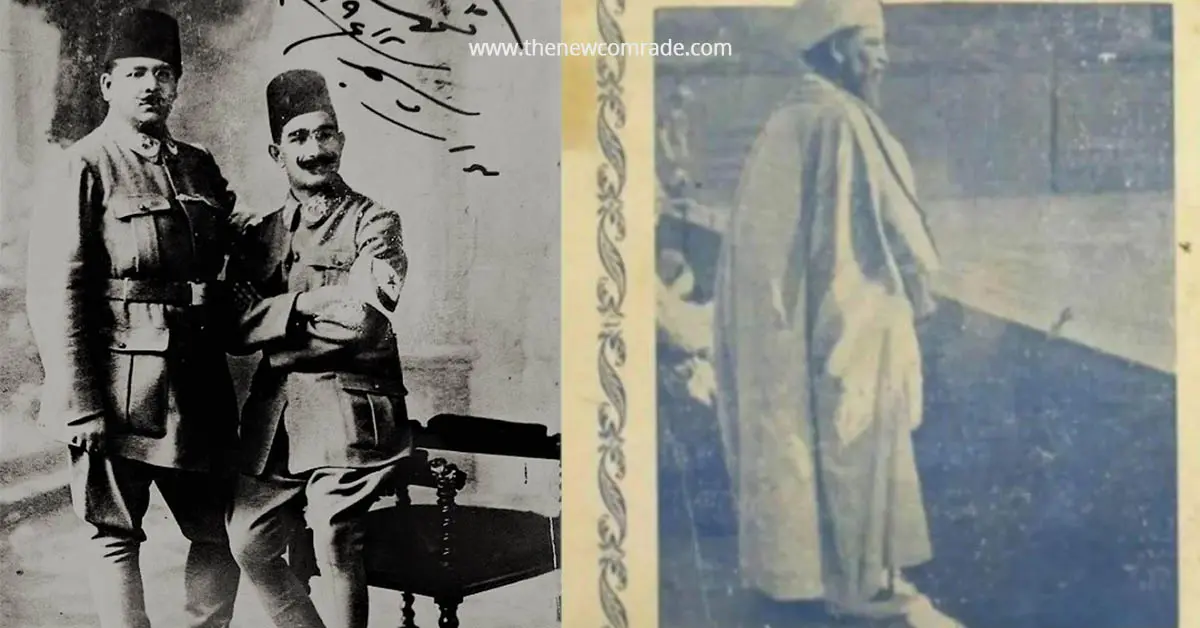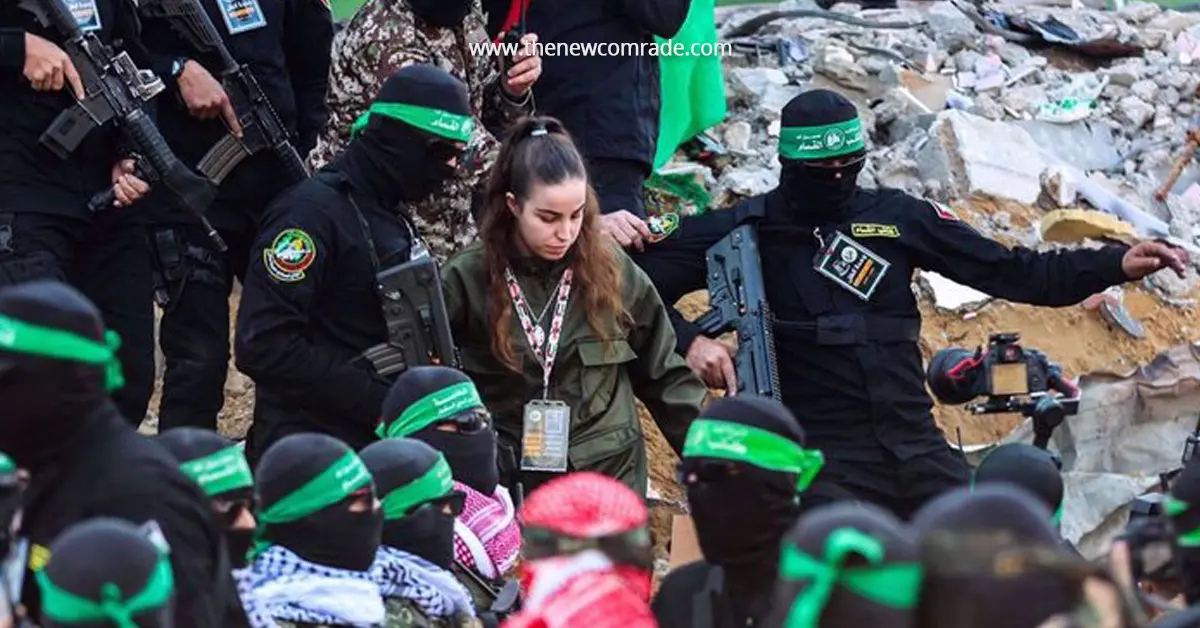Sound of an explosion pierced her ears, shaking the room and her heart. Successive blasts rattled her senses, and fear stirred deep anxiety within her. She saw everything with wide eyes—until darkness drew its curtain over Nour (34). She had no idea that the trembling she felt, and the weight that suddenly pressed down on her, was not “just blankets thrown over her while she was asleep,” as she had thought. It was slowly that she realised that her sister-in-law’s house, where they had sought refuge along with her kith and kin, had been bombed in Nuseirat Camp at 4:20 a.m. on November 21, 2023. They were 48 people in total.
Nour initially hoped that it was one of their neighbouring houses that had been hit. It took time for her to realise that they themselves had been directly targeted. She could not move any part of her body or lift the weight crushing her head. She was completely trapped under the rubble. Her voice echoed hollow and unanswered as she called out to her children and mother, who had been sleeping in the same room: Layan (13), Adnan (12), Adam (9), and her mother. Her eldest son Ezzeddin (15) had been wearing new clothes and had gone downstairs to be with his father Mohammed Eleian and uncles—she had not seen him that night.
“Probably, they are unable to hear me,” she tried to keep herself optimistic. Until 6 a.m., she drifted in and out of consciousness, praying for rescue. Then she heard someone shout, “Is there anyone alive?!” At that moment, the gravity of the situation hit her. She feared for the lives of her family. She called out from underneath the rubble.

A dose of hope
As she was rescued from the rubble, she began looking for the others. She saw her daughter Layan’s mattress ; she asked the rescuers about her and pointed to where her children had been sleeping. As they searched, she walked with them towards the ambulance, and refused to leave until she was reassured about her children. Someone gave her a flicker of hope, saying some injured people had been taken alive to the hospital. So, she went with them.
Trying to piece together scattered memories, she says, “At the hospital, the courtyard was full of bodies. I moved from one to the next, trying to identify them until I found my son Adam’s body—then my mother’s, then the rest of the family. I kept hoping to find one of my children alive. I prayed over everybody I stepped past, but eventually, I realised they had all been martyred.”
In a horrific massacre, 37 members of her husband’s family— Eleian family—were killed. Nour stood before a mountain of loss: her husband, her sons and her daughter — all had gone. As a child, she had experienced the loss of her father – Adnan el-Ghoul – who was assassinated in 2004 – and, later, her brothers – Mohammed and Bilal. This time, the pain felt sharper, with her mother’s martyrdom.

Eve of the massacre
The day before this massacre, Zionist army had targeted the home of her husband’s brother, where the family had sought refuge. Her husband and his brothers spent the entire day in rescue activities and returned home late. The family gathered for what would be their last dinner together, after cleaning off dust from their clothes and praying together. “We all sat together, talking about the expected ceasefire,” she recalled. “I was proud of my eldest son. He had gone with the men to help them. I told him, almost prophetically, ‘You are going to be a doctor—you are not afraid of blood.’ He smiled back at me like he had grown up. I gave him new clothes, and he went to shower while I joined the women upstairs. I did not see him again”.
Her memory lingers on her mother’s chilling words, as if sensing what was to come: “Tonight is our turn.” Nour asked, “Why do you say like that?” Her grandmother replied that if she was scared, she could go to a shelter school with her other daughters.
But she answered, “I am not afraid. I had been waiting for this day. Do you think I was alive after your father and brothers were killed”!
Nour pauses at the memory: “She slept peacefully, then woke up 15 minutes before the bombing and asked for the time. I told her it was 4:06. Then she went back to sleep. I was waiting for the dawn prayer when I felt the tremor—and then, total darkness.”
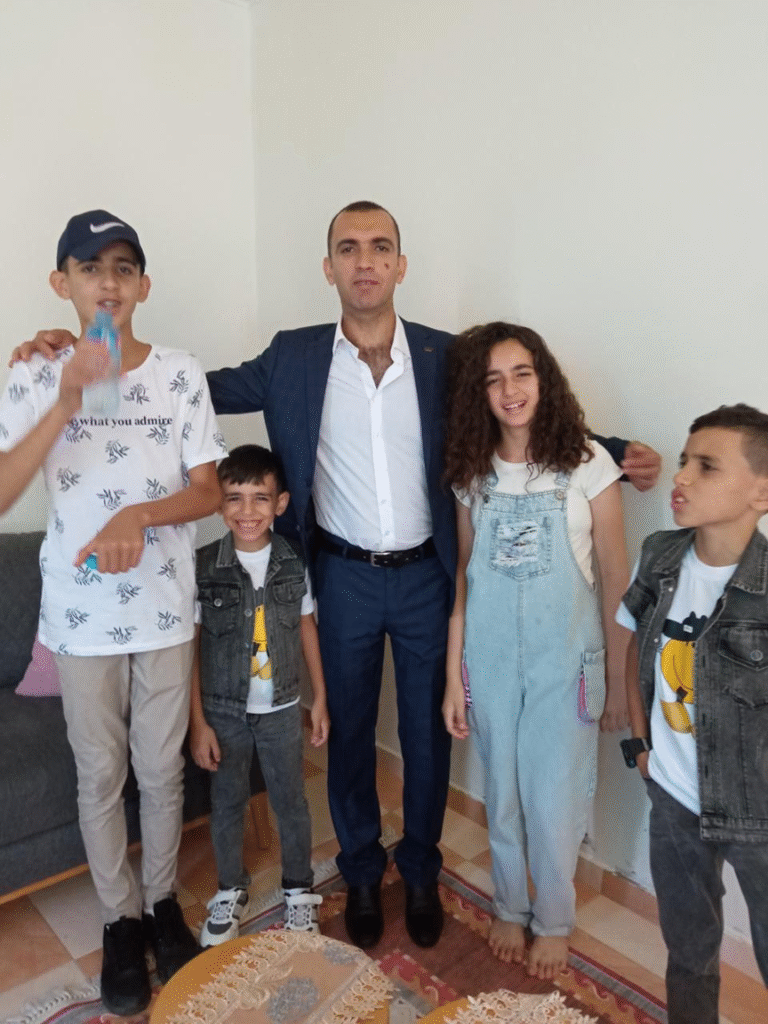
A family of sacrifices
As mentioned before, Nour’s family is deeply rooted in resistance and sacrifice. She became an orphan at 15. Three years later, she married her cousin and lived with his family for 16 years.
She speaks of a family filled with affection and respect: “We were close-knit. Love and mutual respect united us. We spent all our gatherings, outings, and celebrations together, and our life was beautiful. We loved doing good, and everyone around loved us”. Even when the family decided to seek shelter in their sister’s home in Nuseirat Camp, they chose to stay together until they could return to their home in Gaza City. Nour calls them a “beehive” — each person had a role, ensuring the best living conditions possible. “We cooked, baked, and made bread on fire. Everyone sat together, including children. We watched news, mourned our losses, supported one another, and waited for our men to return from queues for bread and water. We stayed up through the shelling and tried to calm the children”.
With pride, Nour speaks of her father: “Being the daughter of a commander is a source of pride for me and the entire nation. He was not just an ordinary commander—he was the first to manufacture bombs and rockets in Gaza. He was a pioneer of resistance alongside Engineer Yahya Ayyash. We lived our whole lives under constant movement and secrecy, even changing names in schools so that no one would recognise us.” From a young age, Nour understood that she could lose the dearest people in her life at any moment. She grew up in an environment of fear, responsibilities, and challenges. Everything she experienced after marriage was a continuation of her childhood—sieges, detentions, even house arrest.

Her father, Adnan el-Ghoul (c. 1962 – 21 October 2004) was second to Yahya Ayyash and later assistant of Mohammed Deif – leader of Ezzeddin el-Qassam Brigades. He was killed in a targeted killing along with Emad Abbas when a Zionist AH-64 helicopter attacked their car in Gaza on 21 October 2004. With a range of two kilometres, he was one of the key leaders in weapons manufacturing for the Palestinian resistance, in his time. After his assassination, her mother struggled and raised the five daughters and two sons alone. Nour recalls: “My aunt wanted to propose me to her son Mohammed, but my mother asked to delay until after high school. Eventually, the engagement happened, and Mohammed supported me through college until we married. It was a family arrangement—my father was his uncle.
Through university, household responsibilities, and motherhood, her husband supported her through many life challenges. “He was a wonderful partner, friend, brother, father, and son—kind to his family and loved by all. His relationship with the children was more like a friend than a father”, she reminisces. She describes her husband as gentle, a good listener, and guiding his children in school as well as other aspects of life. He always brought gifts for his children, nieces, and nephews. Nour’s pain pours out through her voice: ” We did no wrong to anyone. Everyone testifies to their righteousness. Even if I wrote volumes, I could never do them justice”.
Her eldest son, Ezzeddin, stood out with a smile that seemed to never leave his cheeks. He was calm, loved, intelligent, witty, a football player and a weightlifter, despite his young age. He had big dreams in both sports. His sister Layan, their father’s favourite child, was diligent at school, a basketball player, and passionate about learning new things. Adnan, who carried the name of his grandfather the commander, was a dedicated child who memorised parts of the Holy Qur’an and was committed to prayer and remembrance. As for Adam, the youngest, he was sweet, mischievous, smart.
Abscission
This massacre had claimed a long list of family members. From the top of the family tree is the patriarch of the family – Abdulaziz Eleian (86) and his wife Zainab al-Ghoul, their son Mahmoud Eleian with his wife and their four children—the youngest a three-month-old infant.
Mohammed Eleian was martyred with his four children, as mentioned. Nour’s mother, who had been displaced with them, was also martyred. Further, Yousef Eleian, a nurse, was martyred. His wife and children survived as they were in another house at the time of the bombing—they include a son and two daughters.
Their daughter, Nisreen, was martyred along with her two sons viz., Esam, a pharmacist, and his two children, and Engineer Hossam Abderrabbo, who worked at a telecommunications company “Ooredoo”, and his child. Nisreen’s daughters—Isra, Afnan, Misk, and Raghad—were also martyred.
Also martyred was a daughter Jihan, her husband Khaled el-Hamlawi, their son Musa, and daughter Lina along with her husband and their two children, Yahya and Leen.
From al-Haj family – that stayed in the same place, Sarah, Qassam, and Deema al-Haj were martyred. Deema was martyred along with her husband and their infant. She worked for the World Health Organization. They were survived by Dr. Abdullatif al-Haj, who was at work, in the hospital, at the time. His wife Aya sustained fractures in her rib cage, and their daughter was also injured. Two of their grandchildren survived: Abdul Rahman (7), who suffered a fractured pelvis, and his 14-day-old sister Aya, who was born during the war and miraculously pulled alive from under the rubble, though she suffered a brain haemorrhage. Two children from their sisters’ families also survived the massacre.
